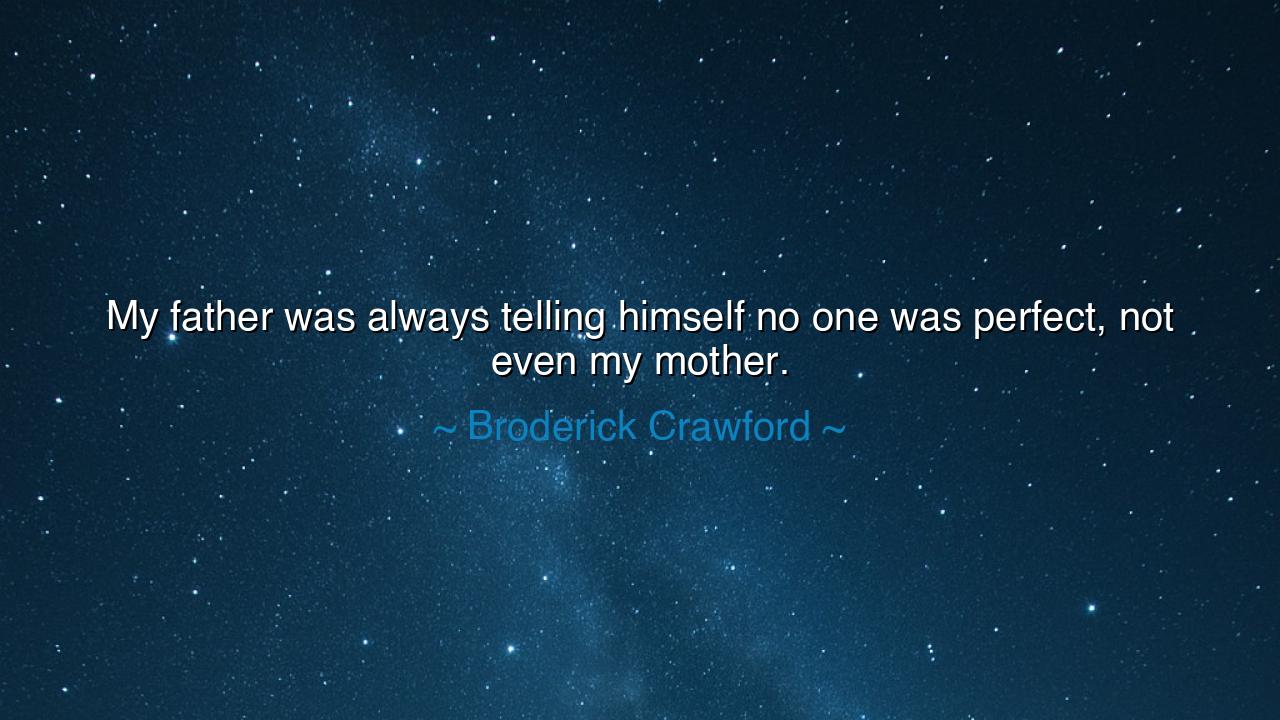
My father was always telling himself no one was perfect, not even






The words of Broderick Crawford—“My father was always telling himself no one was perfect, not even my mother”—are more than a passing reflection on family life. They are a mirror held to the heart of humanity itself. Within this simple recollection lies a timeless truth: that perfection is an illusion, and wisdom begins only when we accept the flawed beauty of those we love, and of ourselves. The ancients would have called this a teaching of balance, for in recognizing imperfection, one learns compassion, patience, and humility—the pillars of lasting peace.
The father in Crawford’s memory speaks not in bitterness, but in understanding. To say that “no one is perfect” is not a condemnation; it is an absolution. It is the release of the soul from impossible expectations. Even those we hold most sacred—our parents, our partners, our heroes—are human, shaped by frailty as much as by grace. The father’s reminder to himself is the whisper of acceptance that all must learn: to love is not to worship the flawless, but to cherish the real.
In the ancient world, the philosophers of Greece and the sages of the East alike spoke of this same truth. The Stoics taught that to demand perfection from others was to battle against nature itself. “Even the sun,” said one, “has its spots.” Yet the light it gives remains no less divine. So too, in the household of Crawford’s youth, the father saw the small imperfections of love not as cracks in its foundation, but as the lines that gave it shape. For the family that learns to forgive one another’s flaws builds a home stronger than marble.
Consider the story of Marcus Aurelius, the philosopher-emperor of Rome. Surrounded by the burdens of leadership and the failings of those around him, he wrote in his meditations, “When you wake in the morning, tell yourself: today I shall meet the meddling, the ungrateful, the arrogant... but they are my brothers.” His strength was not born of anger or disappointment, but of understanding. Like Crawford’s father, he knew that to live among humans is to live among imperfection—and to respond with gentleness rather than scorn is the mark of true greatness.
There is also tenderness hidden in Crawford’s recollection. The father’s statement—“not even my mother”—reveals both reverence and realism. He loved her, yet saw her clearly, not as an ideal, but as a woman with her own light and shadow. This is the highest form of love: not blind devotion, but truthful devotion. For love that sees clearly and still chooses to remain is love that endures. It is the kind of love that survives the winters of disappointment and blooms again with every spring of forgiveness.
From this, a profound lesson emerges for all who seek wisdom: to love well, one must let go of perfection. When we demand flawlessness from others, we turn affection into judgment. When we demand it from ourselves, we turn growth into shame. The wise learn to see imperfection as the sculptor’s mark upon the marble of life—a sign that something living is being shaped. The father’s words, remembered by the son, teach that peace comes not through faultless hearts, but through hearts willing to forgive.
And so, dear listener, carry this truth into your days: no one is perfect, not even the ones you hold most dear. When you are hurt, pause before anger and remember the humanity of the one before you. When you fail, be kind to yourself, as you would to a friend. Perfection is not the goal—understanding is. Walk gently, love truthfully, and hold others not to the measure of angels, but to the grace of being human. For in that grace lies the secret of enduring love, and in acceptance, the quiet strength that outlasts all things.






AAdministratorAdministrator
Welcome, honored guests. Please leave a comment, we will respond soon